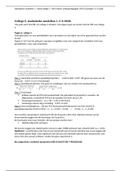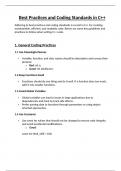Samenvatting
Samenvatting Psychological Science Hst 8 t/m 15
- Instelling
- Rijksuniversiteit Groningen (RuG)
Dit is een samenvatting van hoofdstukken 8 t/m 15 van Psychological Science. Handig voor het 2e deeltentamen. De samenvatting is ondersteund door plaatjes.
[Meer zien]











